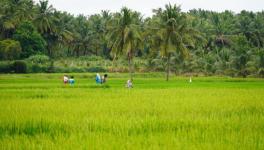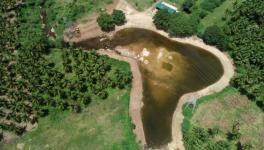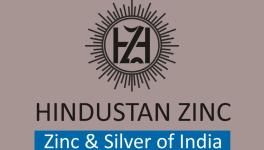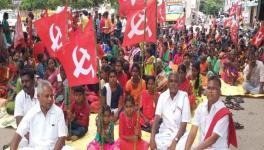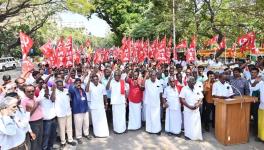Why Tamil Nadu Farmers Oppose Hydrocarbon Project?
Image for representational use only.Image Courtesy : The Hindu
The Hydrocarbon project has given rise to a massive outcry in Tamil Nadu, particularly in the delta districts including Ariyalur, Cuddalore, Thanjavore, Thiruvarur, Nagapattinam, Trichy and Pudukottai. The region is also known as Cauvery Basin (CB). The permission for exploration sanctioned to Vedanta Group – which has a history of casually flouting the rules regularly – has attracted severe criticism. The farmers, fishermen and environmental activists fear the massive exploration will lead to severe damage of the ecosystem.
The dependence for oil and gas of the country on imports is 75% as of now and the Directorate General of Hydrocarbons (DGH) aims to reduce the import dependence by 10% in 2022, which seems like an uphill task. On the other hand, prime minister of the country has been continuously insisting on the need for ‘clean energy’.
The urgency shown by the government in depleting the natural resources is highly contradictory to its own claim of reliance on clean energy. The government also seems highly unconcerned about the environmental impact of such exploration using non-conventional methods.
Policies and Poor Planning Reduce Paddy Cultivation in Delta Region
The Cauvery Delta Zone comprises of a geographical land area of 14.47 lakh hectares. With paddy as the principal crop – which has been double cropped since a few years ago – the region still accounts for 40% of total paddy cultivation of the state. The region is also known for cash crops and fruit cultivation. The entire zone depends largely on agriculture and most of the labourers depend on agriculture for their livelihood. But post 1991, with the government restructuring its priorities, the farm sector started to feel the crunch. Tamil Nadu was not an exception as the agricultural production dipped from 13% in 2001-02 to 8% in 2011-12.
A study titled Combating Climate Change: Vulnerability of Cauvery Delta, Food Security and Livelihood Resilience by Prof. S. Janakarajan of Madras Institute of Development Studies found out that the area under paddy cultivation had reduced enormously while cotton, sugarcane, pulses and banana had made inroads into the region. The irrigated area in the delta reduced from 24 lakh acres to 18 lakh acres during the two decades till 2016. The report also recognised that the increase in industrial and domestic pollution played a role in the reduction in paddy cultivation.
In spite of all these findings, the Union government continues to permit hydrocarbon exploration and extraction neglecting the issues faced by the farmers. The state government too is not inclined to ensure preservation of water bodies; the farm sector is on a continuous decline.
Hydrocarbon and Delta Region
As per the Hydrocarbon Outlook 2017-18 report released by the DGH, the CB has rich hydrocarbon reserves in regions such as Tanjore (Thanjavore) sub basin, Ariyalur - Puducherry, Tranquebar (Tharangambadi), Nagapattinam and Ramnad (Ramanathapuram) - Palk Bay. The major operative plays listed by the report include Andimadam, Bhuvanagiri, Nannilam and Kamalapuram. The basin area of 2,40,000 square kilometres is one of the largest category-I basin in the country with assessed resources of up to 1,964 Million Metric Tonnes of Oil Equivalent (MMTOE).
Ever since the presence of hydrocarbon reserves was discovered in the CB during 1980, the Oil and Natural Gas Corporation (ONGC) has been extracting crude oil and natural gas in the region. There are three oil and six gas basins categorised as Class I, which are commercially viable. As per the data available, there are around 700 wells drilled while 200 wells are yielding output. The production is estimated at 600 tonnes of crude oil and 30 lakhs cubic metres of gas per day. But this quantity amounts to only 0.5% of Oil and 1% of gas production in the country.
The estimated availability of hydrocarbon in the CB is about 270 million tonnes in the offshore region and 470 million tonnes in the onshore region. The approximate worth of oil and gas available onshore alone is estimated to be Rs 14.34 lakh crores. Neduvasal region, the epicentre of struggles during 2017, against the hydrocarbon project being sanctioned to the GEM Laboratories from the ONGC, is capable of generating revenue of Rs. 300 crores per year while Kathiramangalam has seven wells generating revenue of Rs 2 crore per day.
The ONGC pays a royalty of Rs 20 lakh per day for the Kathiramangalam area and Rs 40 crore per year for the Neduvasal area to the government of Tamil Nadu. The state government has received a sum of Rs 1,816 crores as royalty alone from ONGC during the last five years.
TNPCB and Inferior Monitoring Mechanism
The ONGC has been extracting hydrocarbon in the CB so far and there are numerous incidents of on oil spillages in the region due to lack of maintenance of the pipelines by ONGC. The Tamil Nadu Pollution Control Board (TNPCB) has been widely criticised for its poor monitoring of violations by the ONGC with respect to water and air quality factors.
A study report by Cauvery Delta Watch under the aegis of Chennai Solidarity Group accuses the TNPCB of colluding with the ONGC and the state for violation of rules and use of police force against the public for exposing the violations. The report alleges that the TNPCB has details of only 219 wells being dug whereas the ONGC claims to have drilled around 700 wells. The report also claims that the TNPCB has details of only 71 operational wells whereas the ONGC claims to have 183.
The more disturbing allegation by the group is that the 219 wells as per the TNPCB data too do not possess a valid ‘Consent to Operate’ required for the commencement of operation in the site as mandated by the Air (Control and Prevention of Pollution) Act, 1981 and Water (Control and Prevention of Pollution) Act, 1974. The report also alleges that eight dangerous incidents of oil spillages and leaks have happened between August 2011 and February 2018 in the region.
With the allegations finding little attention and with ONGC denying such mishaps, the fear among the public needs to be addressed.
Hydrocarbon Reserves in CB
The government of India has announced that 31 more areas in the CB have hydrocarbon reserves and companies have been invited for carrying out exploration and extraction. The revenue from these regions is estimated to be Rs 46,400 crore, out of which, the Tamil Nadu government would get Rs 5,000 crores as royalty. The shallow waters of the Cauvery, deep waters, Srilanka/Gulf of Mannar Basins are expected to have large resources to be explored.
Incidentally, the crude oil production in the country has reduced from 35.7 million tonnes in 2017-18 to 34.2 million tonnes in 2018-19, whilst the natural gas extraction stood at 32.9billion cubic metres. The government seems more inclined on increasing the production to decrease the dependence on imports by compromising on the environmental impact. With many other countries are moving towards phasing out of petrol, diesel vehicles in the near future, the Union government continues to switch between speaking about clean energy and fossil fuel extraction.
HELP and Issues on Single Licensing Policy
The present sanctioning of blocks to ONGC and Vedanta Group has been as per the new policy announced by the Narendra Modi-led government in 2016 Hydrocarbon Exploration Licensing Policy (HELP). It grants permission to extract all types of hydrocarbon including Coal Bed Methane (CBM), Shale gas and oil, Tight gas and oil using the process called hydro fracturing, which is banned in European Union countries, owing to environmental issues.
The environmental activists and experts in the area claim that the term hydrocarbon is totally misguiding as the state-owned and private companies can use the same licence for exploring and extracting all types of hydrocarbons. Such a project, if implemented, in the fertile lands of delta regions, the impact and damages to the environment and the health of the residents of the region would be practically irreversible.
Also read: Mass Mobilisation Against Hydrocarbon Project in Tamil Nadu
Get the latest reports & analysis with people's perspective on Protests, movements & deep analytical videos, discussions of the current affairs in your Telegram app. Subscribe to NewsClick's Telegram channel & get Real-Time updates on stories, as they get published on our website.









